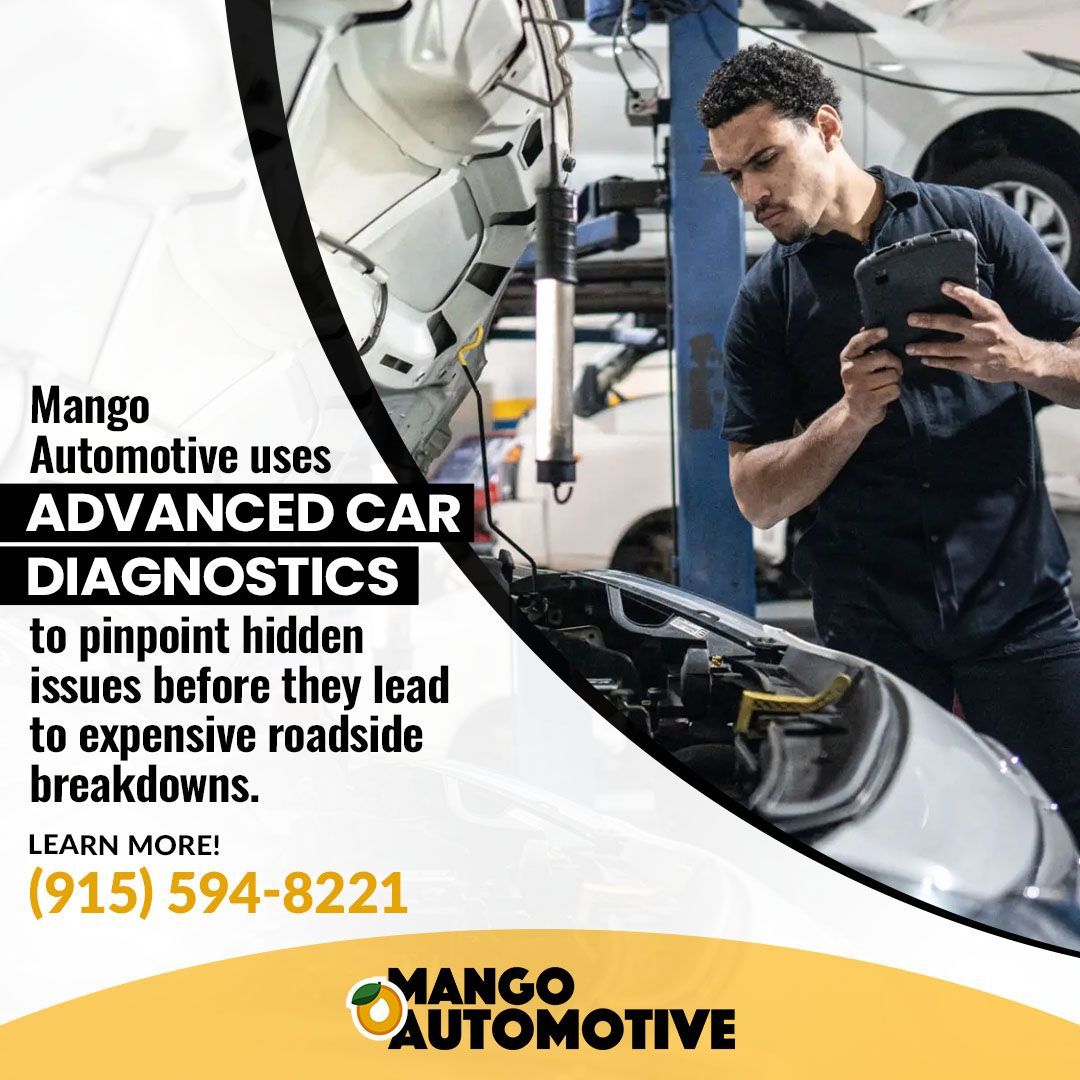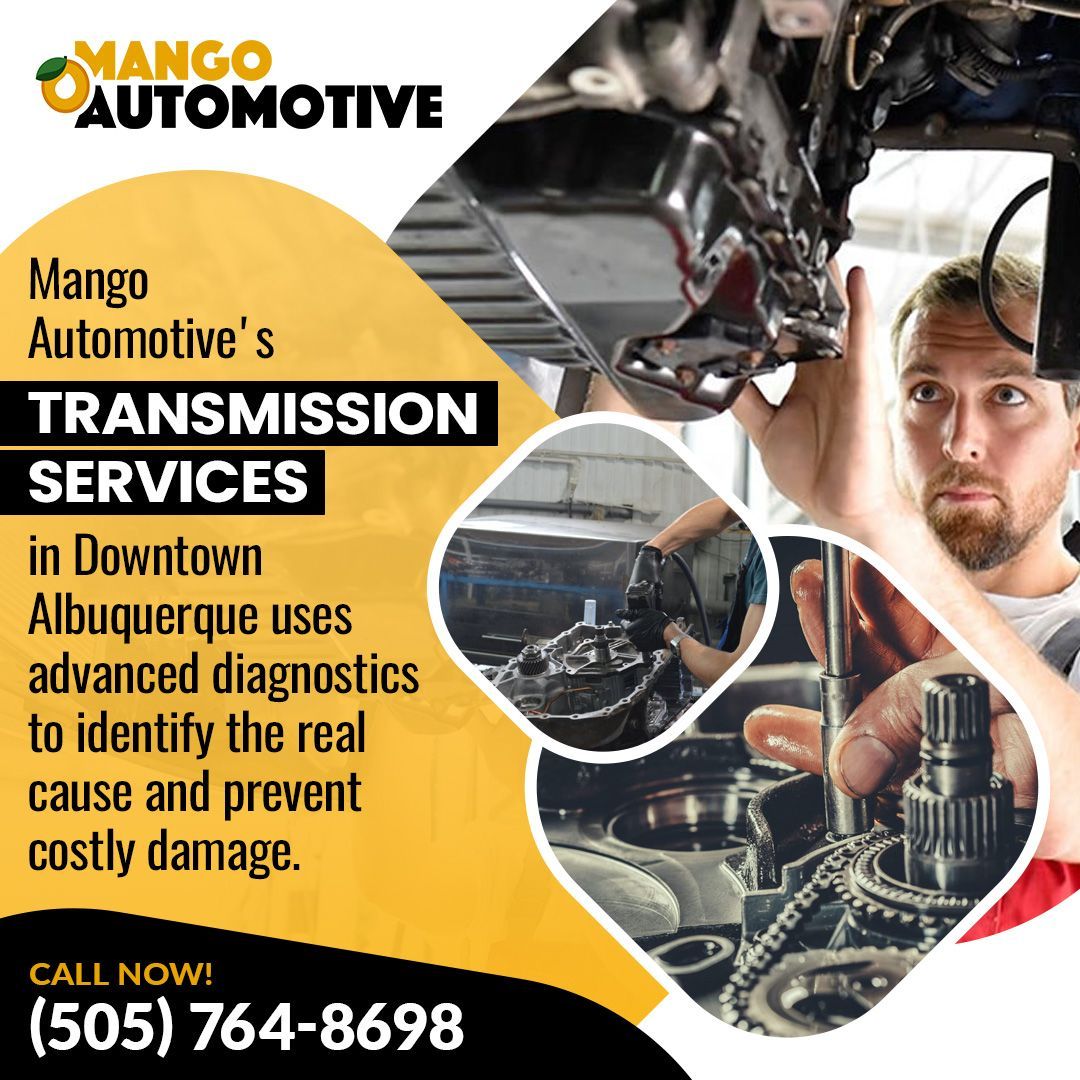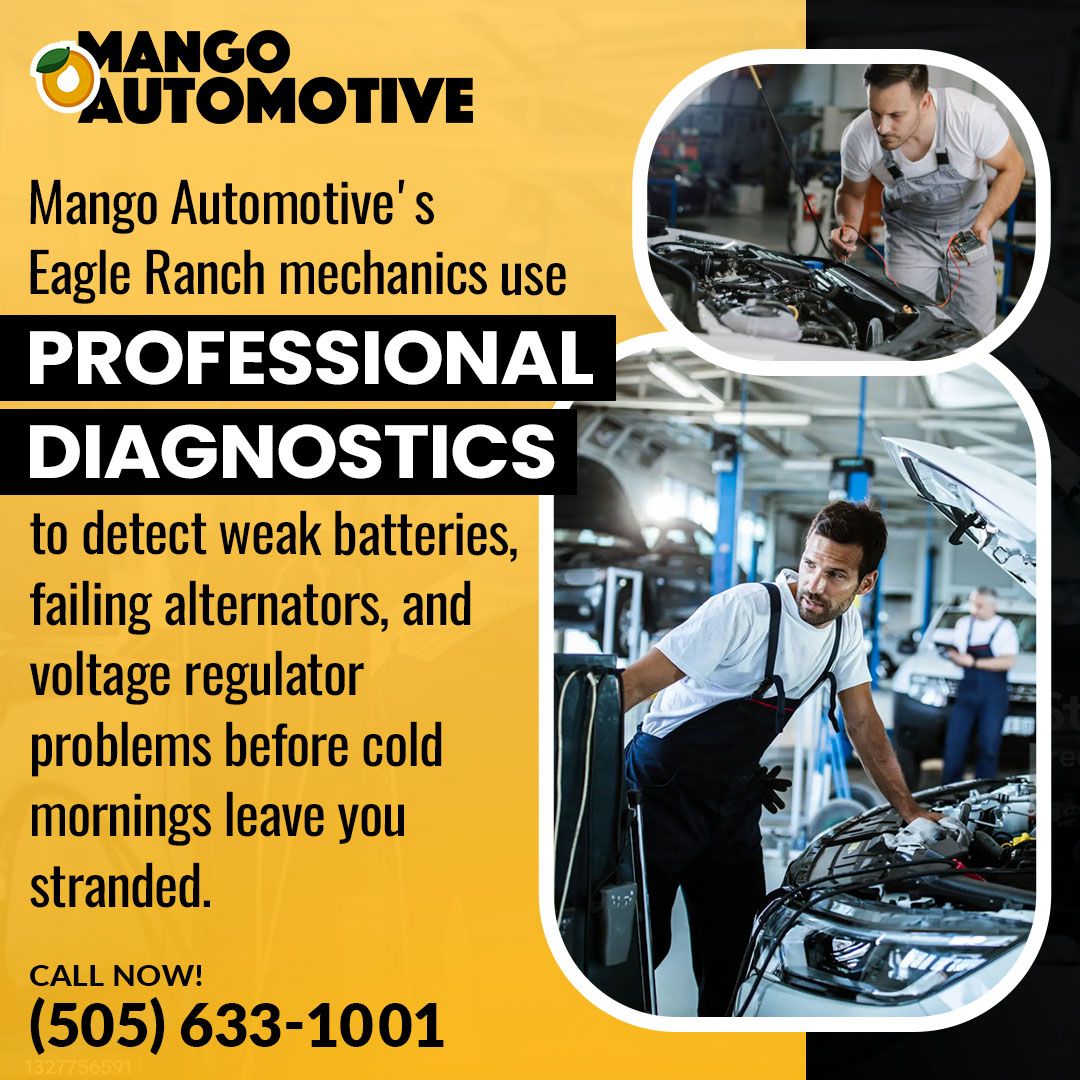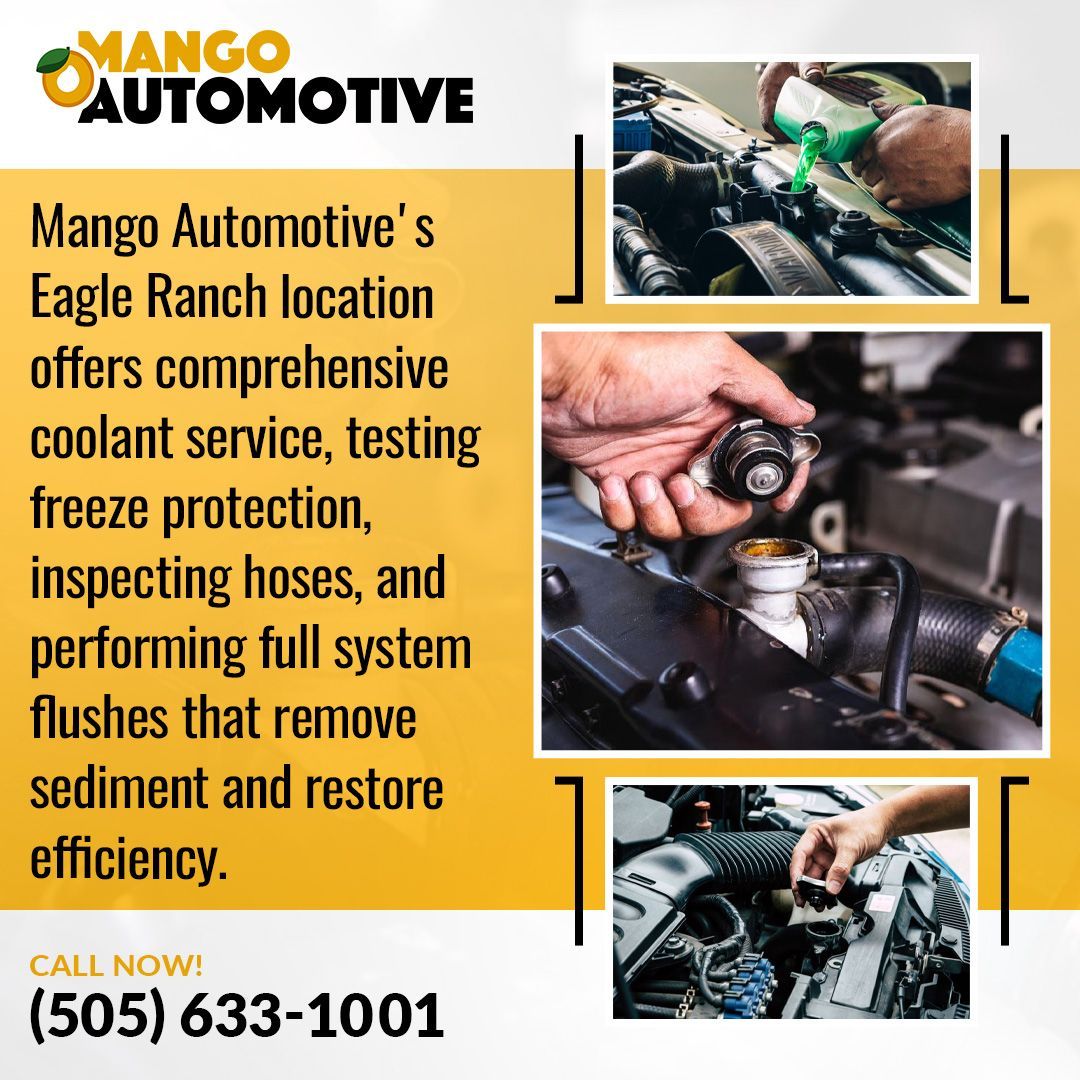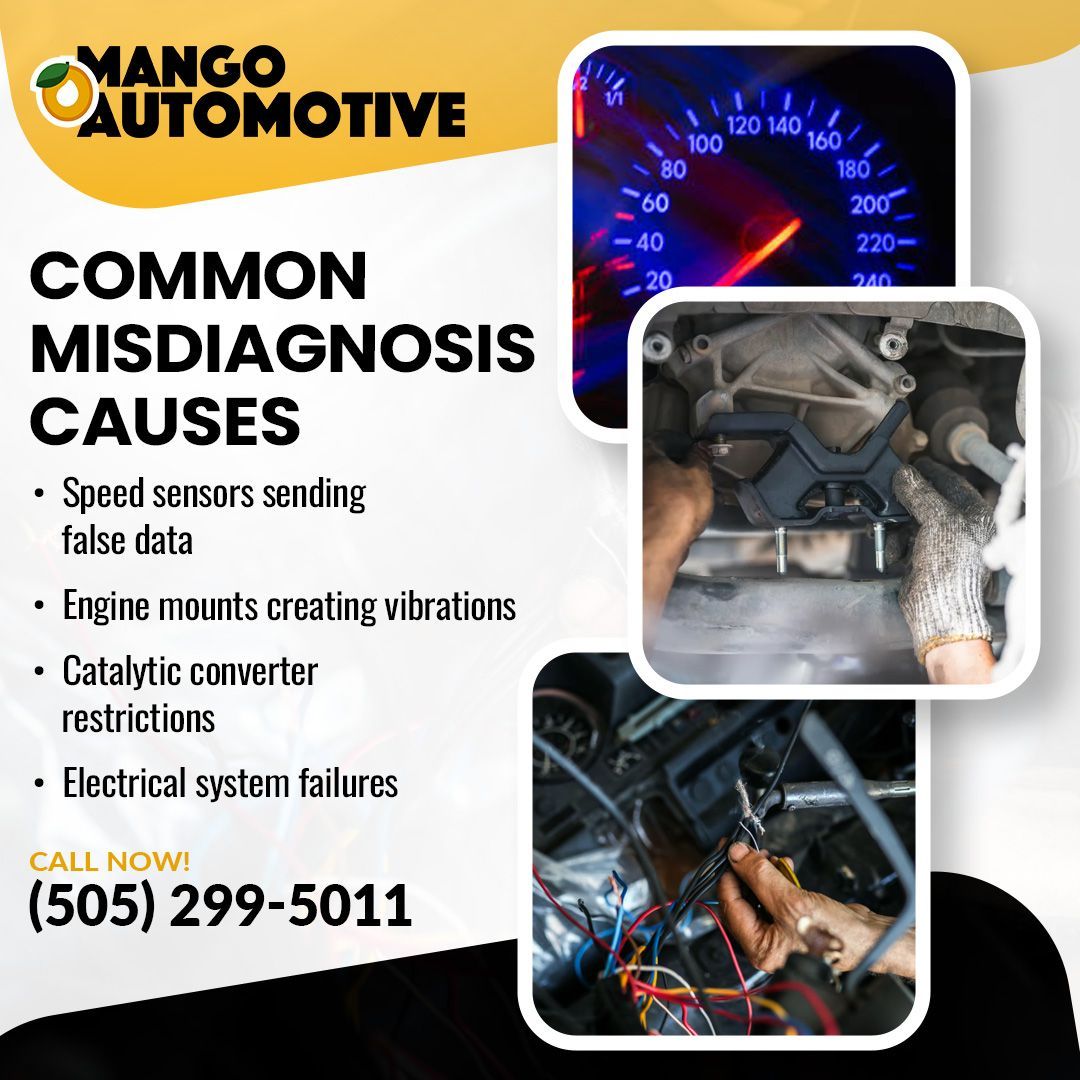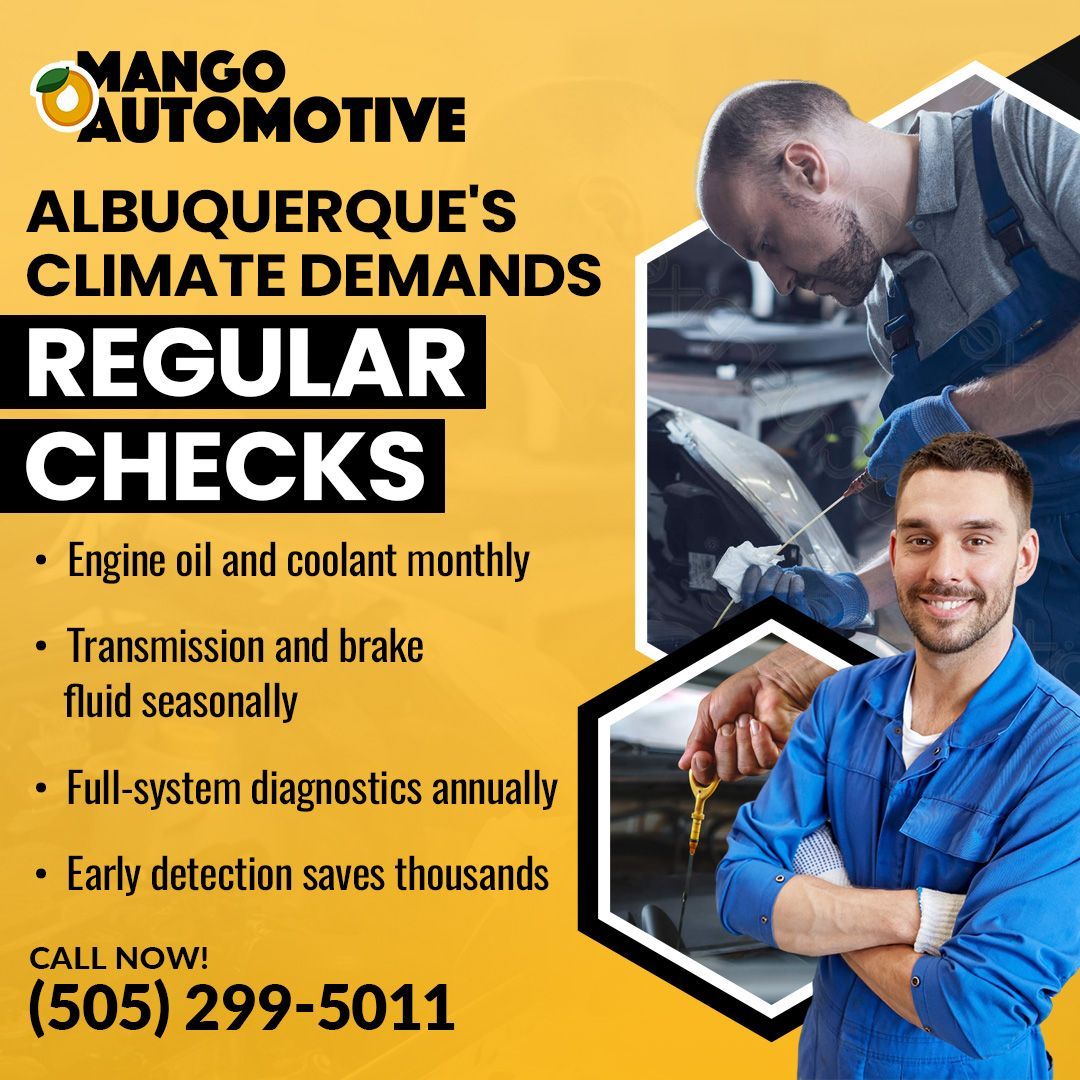Is It Time for New Brakes? Mango Automotive Breaks Down the Signs for Albuquerque Drivers
Brakes are one of the most important safety features in a vehicle. If they fail, it significantly compromises your ability to stop safely, making all other safety features less effective. Knowing when to replace them can help you avoid breakdowns, costly repairs, and unsafe driving conditions. Most brake parts wear gradually, making it harder for drivers to notice changes right away. But warning signs do appear—and when they do, they shouldn’t be ignored.
At
Mango Automotive, we see how traffic patterns, road conditions, and driving habits affect brake wear. This article breaks down how to spot signs that your brake system needs service, how local conditions impact wear, and what to expect from a professional inspection at trusted
auto repair shops like ours.
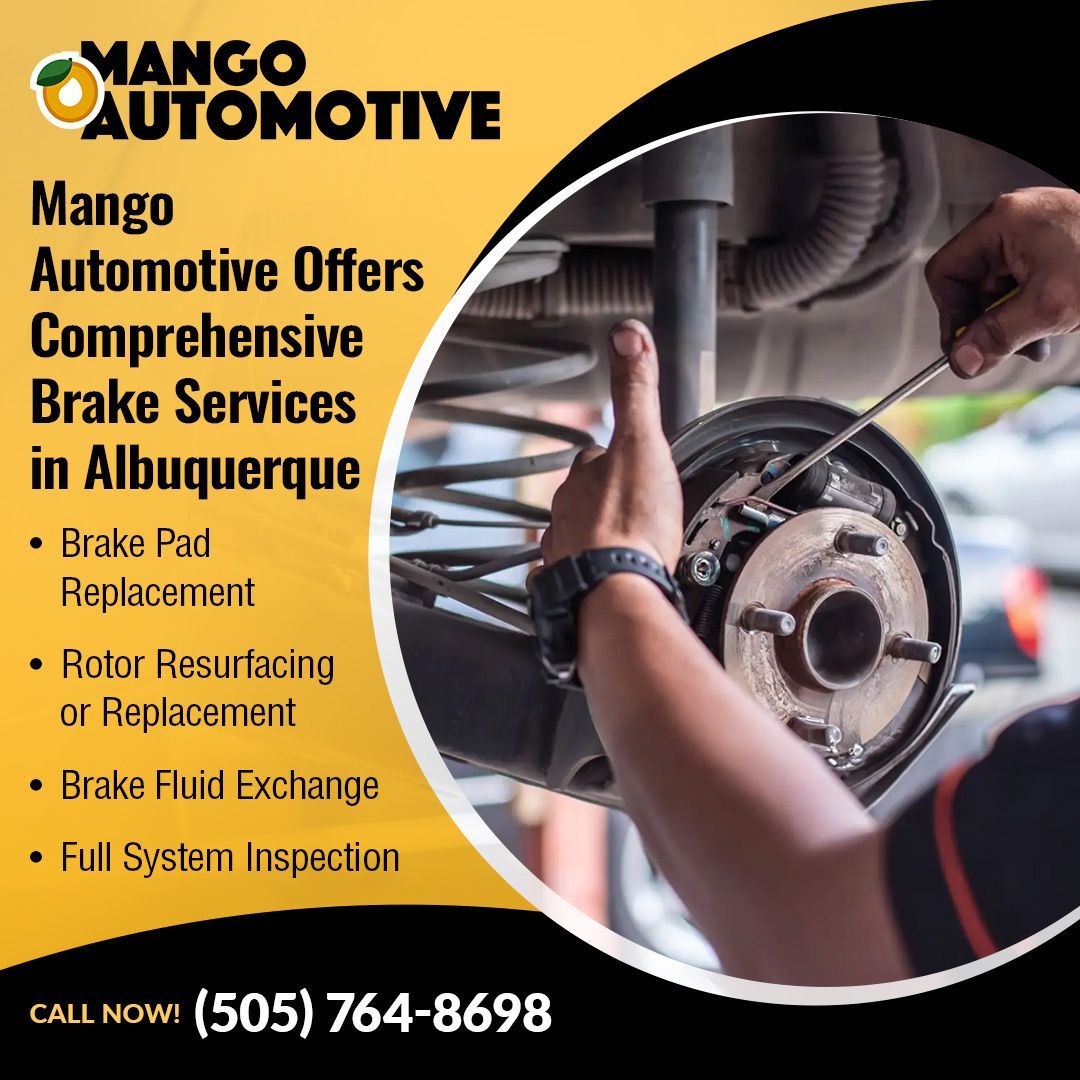
What Brakes Actually Do and Why They're More Than Just Pedals and Pads
Brakes slow your vehicle by turning motion (kinetic energy) into heat energy, using pressure and friction. This process involves more than just mechanical parts. Brakes must manage heat, repeated pressure, and wear over time. In city traffic, drivers brake more often, leading to faster wear. This makes maintaining the brake system a key part of regular automotive repair.
Basic Mechanics of Modern Brake Systems
Modern brakes rely on hydraulics, friction materials, and electronic sensors to perform consistently. Most passenger vehicles use disc brakes. These systems include brake pedals, master cylinders, brake fluid, calipers, pads, and rotors. When you step on the pedal, fluid moves through the brake lines to push the caliper pistons. This clamps the brake pads onto the rotor (metal discs attached to each wheel), creating friction that slows the vehicle.
Electronic brake force distribution
(EBD) and anti-lock braking systems (ABS) are also common. They adjust how much pressure is sent to each wheel, especially during hard stops or slick road conditions. This prevents skidding and improves control. Auto repair shops regularly service these systems to maintain safe stopping distances and protect other parts of the vehicle.
Differences Between Front and Rear Brake Wear
Front brakes usually wear faster because they handle more of the vehicle's stopping force. When a vehicle brakes, the weight shifts forward. This gives the front brakes about 60–70% of the workload. They’re larger and wear out quicker. Rear brakes balance stopping and support emergency braking systems, like parking brakes.
At Mango Automotive, our auto repair technicians check both sets during routine maintenance. It’s common for front brake pads to be replaced twice as often as rear pads. Ignoring either set can lead to uneven braking, increased stopping distances, and higher long-term repair costs.
Real-World Clues Your Brakes Are Nearing the End
Unusual sounds, sensations, or warning lights can signal brake wear or failure. Most brake problems develop gradually, and your car often gives early signs. These include high-pitched noises, grinding, vibration, or a brake warning light. If you notice any of these signs, visit Mango Automotive for detailed brake inspections and reliable auto repairs in Downtown Albuquerque.
Sounds That Shouldn't Be Ignored
Unusual brake noises often mean worn pads or damaged components. Some brake pads are designed with a wear indicator that creates a high-pitched squeal when they get thin. This is most noticeable at low speeds or during gentle braking. It’s a built-in alert that it's time to visit an automotive repair shop.
Grinding noises suggest metal-on-metal contact, usually because the pads are completely worn. This can damage rotors and increase repair costs. These noises usually get worse over time. Fixing them early keeps the repair simpler and more affordable.
Feel Underfoot: Brake Pedal Feedback Explained
Changes in how the brake pedal feels often point to fluid, pad, or rotor problems. A soft or spongy pedal usually means air or moisture in the brake lines. A firm pedal that suddenly sinks under pressure may suggest a leak or a failing master cylinder. Both require immediate automotive repair.
Delayed pedal response or needing more pressure to stop is a common sign of worn pads or low fluid. Delaying brake pad replacement can cause damage to rotors, calipers, and other components, potentially increasing repair costs.
Vibration or Steering Pull When Slowing Down
Brake vibration or pulling usually means uneven wear or rotor issues. If the car shakes when braking, it could mean warped rotors or uneven pad wear. If the steering pulls to one side, the issue might be with a sticking caliper or an uneven brake force between wheels.
Uneven tire pressure or suspension problems can also cause similar symptoms, so proper diagnostics at a trusted auto repair shop in Albuquerque is important. Many shops offer a full brake inspection as part of scheduled maintenance.
Low Brake Fluid: What It May Indicate
Low brake fluid often means worn pads or a possible leak in the system. As brake pads wear down, calipers extend farther, which lowers fluid levels. A drop in fluid is normal over time, or it can be a sign of a leak. Brake fluid is also hygroscopic, so it absorbs moisture, resulting in reduced stopping power. If your dashboard shows a brake warning light or you need to top off fluid often, schedule a brake inspection with your auto shop in Albuquerque.
Mango Automotive is a trusted choice for auto repairs in Downtown Albuquerque, offering full-service brake diagnostics and repairs. Our team helps drivers stay safe with accurate inspections and clear explanations of what needs attention.
Causes of Brake Wear
Brake wear is influenced by driving conditions, the type of components, and even the local environment. Understanding what causes brake wear can help extend the life of your brakes and save on auto repair costs.
Driving Conditions and Habits
The way you drive affects brake wear and longevity. Frequent hard braking, rapid acceleration, and stop-and-go driving contribute to faster brake wear. The habit of "riding the brake" (applying light pressure on the brake pedal while driving) can also speed up wear. If you frequently drive in urban traffic, it’s advisable to have your brakes checked regularly by an automotive repair shop.
Type and Age of Brake Components
Brake pads and rotors wear differently depending on their materials and age. Ceramic brake pads last longer than semi-metallic pads but are more expensive. Rotors, on the other hand, can last for thousands of miles, but they can still become warped or worn down, especially under extreme driving conditions. If you live in or around Albuquerque, where elevation changes can stress brakes, it’s important to consider both the quality and age of your components.
Old or poorly maintained brake parts increase the risk of brake failure. The average lifespan of brake pads is between 30,000 and 70,000 miles, depending on the type of driving you do. Checking components regularly at a trusted auto shop in Albuquerque can catch any problems early.
Local Climate and Road Conditions in Albuquerque
Weather and road conditions in Albuquerque impact brake wear over time. Hot, dry conditions can lead to quicker brake pad wear due to higher friction from frequent braking. Sand, dirt, and debris from desert roads also contribute to brake wear by causing pads to wear unevenly or become contaminated.
Though Albuquerque doesn’t experience extreme freezing temperatures in winter months, rain and cold weather can still create additional challenges for brake systems. Moisture can cause corrosion and reduce brake fluid effectiveness.
By understanding these common causes of brake wear, you can take preventive steps to avoid premature damage. Routine maintenance will keep your braking system in good condition, ensuring both safety and cost-efficiency for your vehicle.
How Often to Check Your Brakes
Knowing how often to inspect your brakes depends on various factors like your driving habits, the age of your vehicle, and local driving conditions. Generally, it’s recommended to have your brakes inspected at least once a year or every 12,000 miles.
General Inspection Timelines
How often you should inspect your brakes depends on your driving patterns. Experts suggest having your brakes checked every 6,000 to 12,000 miles, especially if you drive in busy areas like Downtown Albuquerque with frequent stop-and-go traffic. If you drive aggressively or haul heavy loads regularly, you may need more frequent inspections.
Brake pads generally need to be replaced every 30,000 to 70,000 miles, depending on wear. For maximum safety, have your brakes inspected at least once a year.
What to Ask During Routine Auto Repair Visits
During your auto repair visits, it's important to ask your technician to check not just the brake pads but the entire system. Specifically, ask about the following:
Brake pad thickness:
If the pads are thinner than 1/4 inch, they should be replaced.
Brake fluid levels: Low fluid can lead to inefficient braking and potential brake failure.
Rotor condition:
Warped rotors can cause uneven braking and should be replaced if needed.
Brake lines and hoses:
Inspect for any leaks or signs of wear that could compromise brake fluid integrity.
In Albuquerque’s climate, also ask about the potential buildup of debris or corrosion that could affect brake performance.
At Mango Automotive, we provide clear answers and thorough brake inspections during every visit. If you're looking for dependable auto repairs in Downtown Albuquerque, our team is ready to help you stay safe on the road.
Signs Technicians Look For at Auto Shops in Albuquerque
Technicians look for several key signs when inspecting brakes. At our auto shop in Albuquerque, technicians will pay attention to:
Pad wear: Pads that are worn down to a thin layer can result in less effective braking. If left unchecked, this may lead to damage to the rotors, which are more costly to repair.
Brake fluid quality: If the brake fluid is dirty or low, it can reduce braking efficiency. Technicians check for signs of contamination or air bubbles.
Brake noise:
They’ll check for any unusual sounds like squealing or grinding, which could indicate worn-out pads or damaged components.
Vibration:
They’ll look for signs of rotor warping, which can cause vibrations in the brake pedal when you apply pressure.
We perform these checks as part of our routine service, ensuring your brake system is in top shape and avoiding unexpected issues that could disrupt your driving.
Types of Brake Services Offered by Mango Automotive
At Mango Automotive, we offer a wide range of brake services in Albuquerque to keep your brakes in top working condition.
Brake Pad Replacement
Brake pad replacement helps maintain safe and efficient braking. Mango Automotive provides brake pad replacement services using durable materials for smooth and responsive braking. Brake pads should be replaced when the thickness reaches about 1/4 inch or less.
Rotor Resurfacing or Replacement
Rotors are essential for proper braking, and they may need resurfacing or replacement. Rotor resurfacing removes the imperfections to restore a smooth surface and improves braking performance. Replacement may be necessary if the rotor is too thin or severely damaged. At our auto shop in Albuquerque, we inspect your rotors during every brake check to determine whether resurfacing or full replacement is needed.
Brake Fluid Exchange
Brake fluid exchange is a vital service for keeping your brake system functioning properly. A brake fluid exchange involves draining the old fluid and replacing it with fresh fluid. At Mango Automotive, we recommend performing a brake fluid exchange every 2 years or 24,000 miles, as Albuquerque heat can affect the fluid’s effectiveness.
Full Brake System Inspection
A full brake system inspection makes sure all components are working as they should. Our comprehensive brake inspection service in Albuquerque includes checking all brake components—pads, rotors, fluid, lines, and hoses. This ensures that every part of the brake system is in good working order and prevents more serious issues from developing. Our technicians will also assess for any wear and tear that may not be immediately visible, to keep your vehicle safe and reliable on the road.
Whether you're in need of a brake pad replacement, rotor resurfacing, a brake fluid exchange, or a full brake system inspection, Mango Automotive provides reliable and professional brake services and
auto repairs in Downtown Albuquerque to keep you driving with confidence.
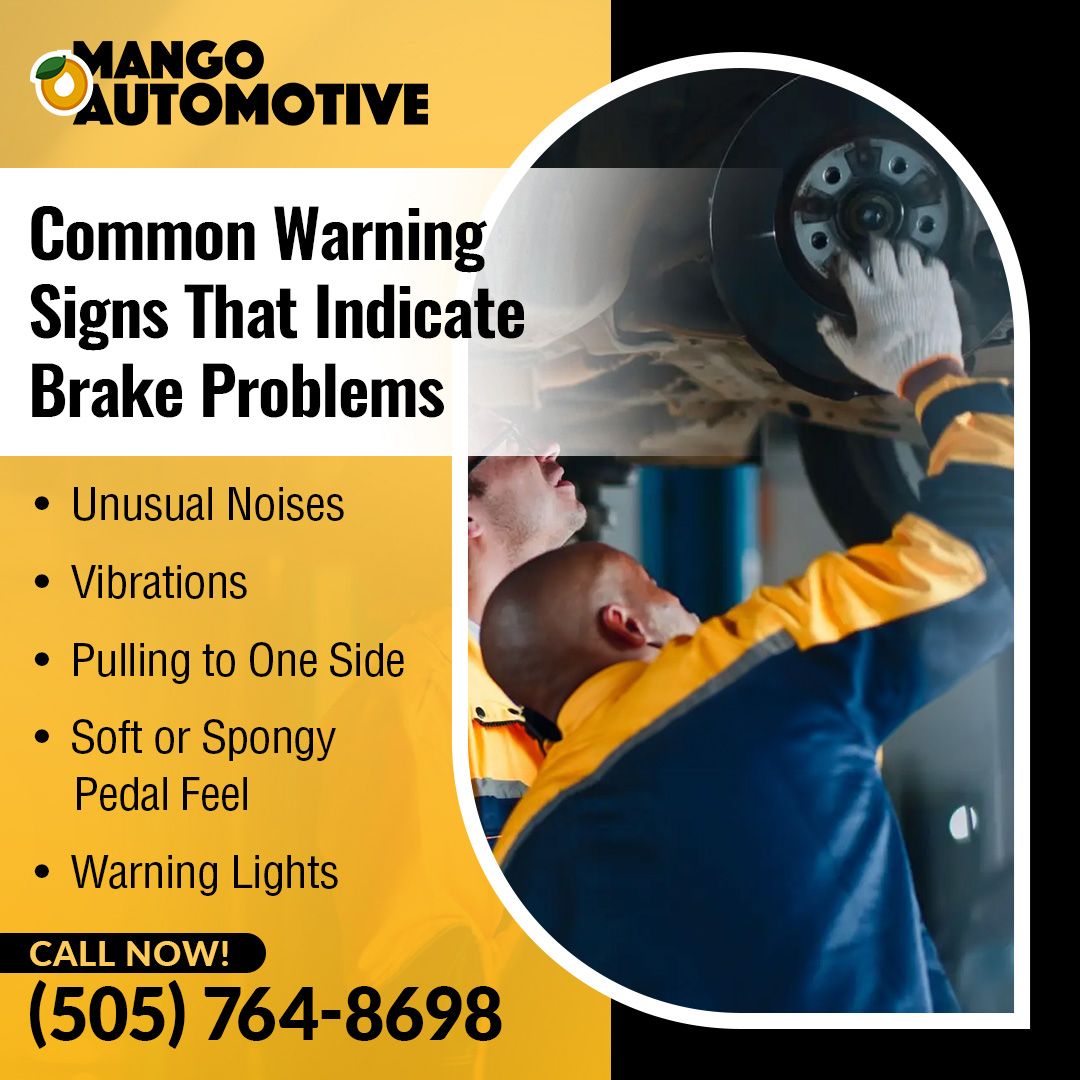
Schedule Your Brake Inspection in Albuquerque
Regular brake maintenance and timely repairs help prevent expensive problems and keep your vehicle safe on the road. At Mango Automotive, we offer brake services, from brake pad replacement to full brake system inspections, using only high-quality components for lasting performance.
Keep your vehicle safe with trusted brake repairs in Albuquerque from Mango Automotive. Whether you need new pads or a full system inspection, our technicians deliver expert service using quality parts. Call us at
(505) 764-8698 to schedule your inspection or speak with one of our experienced technicians.
